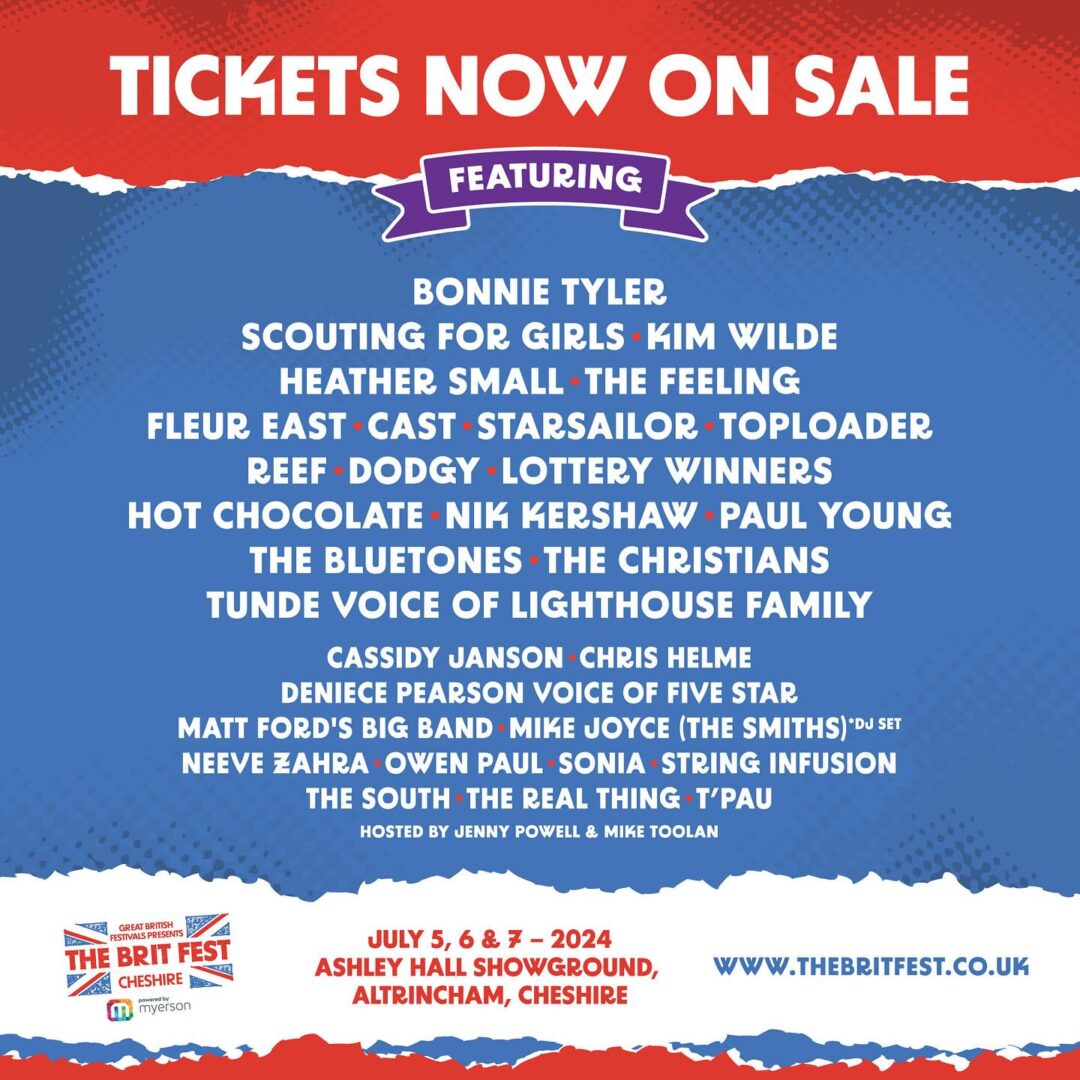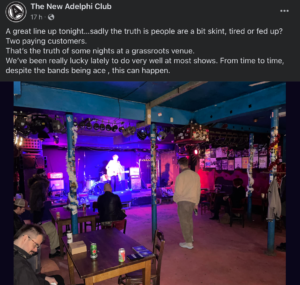The announcement of The Brit Fest, the inaugural event celebrating “the best of British”, may have stoked excitement in music fans who don’t need much persuasion to partake in nostalgia, but beyond the surface of the line-up poster, the festival is a tragic symbol of post-Brexit Britain.
With its red, white, and blue iconography all over the festival posters and official website, the festival seems less a celebration and more a British funeral for festivals as we knew them. This event, set against the backdrop of a nation grappling with its identity and economic challenges post-Brexit, stands as a stark reminder of the changes sweeping across the UK.
Clinging to National Pride
In the wake of Brexit, the UK’s economy has taken a significant hit; a recently published report, which came to light in January 2024, revealed that the UK economy is now almost £140 billion smaller as a result of the majority of voters ticking ‘leave’ on their ballot papers following an obscurely deceiving pro-Brexit campaign. This economic downturn has left many Brits searching for a semblance of hope and assurance, clinging to national pride as their last lifeline. The Brit Fest, in this context, is more than just a festival; it’s a desperate grasp at the straws of national identity and pride, a way for people to reassure themselves that leaving the EU was a beneficial move and the democratic decision wasn’t the sole reason for the cost-of-living crisis that is gradually crippling us.
The Struggle of Festival Organisers
The challenges of post-Brexit Britain are not limited to the economy but extend to the cultural sector as well. UK festival organisers are facing a tough time as American headline acts are increasingly shunning UK festivals. This trend is a direct consequence of the economic and logistical complications brought about by Brexit, making the UK a less attractive destination for global artists. The Brit Fest, focusing on homegrown talent, is a response to this new reality, where international acts are harder to secure.
Don’t get me wrong, I’m all for celebrating and championing British artists, but this celebration of cultural alienation is a dystopic stretch too far in our era where everything is a culture war because we’ve got no culture (in the truest definition of the word) left to celebrate. The collective nationalistic flagellation is a worrying symptom of a society grasping at the echoes of a bygone era, mistaking loudness for substance and spectacle for depth. In this clamour, the true essence of artistry – the raw, unvarnished expression of the human condition – is drowned out by the cacophony of jingoistic fervour. It’s as if we’re in an amphitheatre, where the loudest cheer, not the most profound message, wins the day.
A Homage to Nostalgia
Despite its patriotic veneer, The Brit Fest is essentially a homage to nostalgia. Described by The Manc as “a pure throwback”, the festival mostly features a lineup of British artists from years gone by, evoking memories of a different era in British music. This focus on the past highlights a longing for a time before the complexities and uncertainties of the post-Brexit landscape. It’s a celebration of what was, perhaps, in an attempt to escape the realities of what is. If you want to learn more about why people are being drawn to nostalgia like moths to a flame, read our piece on the neurology of nostalgia and the price the music industry pays for it.
The Brit Fest is An Emblem of Stagnancy in the UK Music Industry
With Bonnie Tyler, Scouting for Girls, Kim Wilde, Heather Smalls, Starsailor, Toploader and Dodgy as the biggest acts on the bill at The Brit Fest, the festival poster proves what happens when the music industry becomes stagnant and refuses to let new bands rise to the top.
Even though music fans would be forgiven for thinking that there are no new bands worthy of securing headline festival slots, that is far from the case. The UK music scene is as vibrant and diverse as it has ever been – bands just can’t grab the same slices of global acclaim as their predecessors, and there are multiple reasons behind this depressing phenomenon.
Changes in the Music Industry
The music industry has undergone significant changes in the last few decades. The rise of streaming services and the decline of traditional album sales have altered how artists gain exposure and make money. This shift has impacted bands worldwide, but British bands, which traditionally relied heavily on album sales and extensive radio play, may find these changes particularly challenging.
Globalisation and Diversification of Music
With the advent of the internet and social media, the music market has become more globalized and diversified. Listeners have access to a vast array of music from all over the world, which means that competition is no longer local or even national but global. This increased competition can make it harder for any one group, including British bands, to dominate.
Cultural Shifts
In the past, British bands like The Beatles, The Rolling Stones, and later Oasis, were part of larger cultural movements that had significant international appeal. The cultural shifts of today might not be as conducive to bands playing a central role, or the movements themselves are more fragmented and diverse.
Economic and Logistical Challenges
For new bands, touring and getting exposure can be expensive and logistically challenging. This is particularly true in the post-Brexit era, where touring in Europe, a key market for British bands, has become more complicated and costly due to new regulations and visa requirements.
Media Focus
The media landscape has also changed, with a more fragmented audience and a shift towards reality TV, solo artists, and celebrity culture. Bands might not receive the same level of media attention as they did in the past, making it harder to gain widespread recognition.
Nostalgia and Comparison with the Past
There’s also a factor of nostalgia and the tendency to compare contemporary music unfavourably with the past. The British bands of the 60s, 70s, and 90s set a very high bar, and contemporary bands are often measured against these legends, which can overshadow their achievements.
–
In conclusion, The Brit Fest, with its nostalgic line-up and patriotic branding, stands as a symbol of the times – a post-Brexit Britain struggling to redefine its identity and place in the world. It’s a festival that is as much about music as it is about the collective psyche of a nation trying to find its footing in a new, uncertain era.
To learn more about how Brexit has impacted the music industry, read our statistical overview of the crushing blow of Brexit on the music industry.
Article by Amelia Vandergast






No Comments